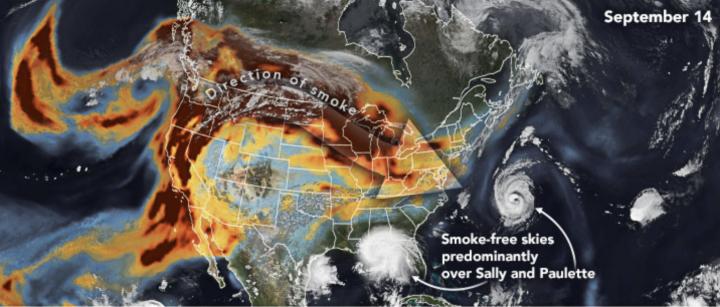
Credit: NASA Earth Observatory, Joshua Stevens
Recent global calamities – the pandemic, wildfires, floods – are spurring interdisciplinary scientists to nudge aside the fashionable First Law of Geography that dictates “everything is related to everything else, but near things are more related than distant things.”
Geography, and by association, ecology, has largely followed what’s known as Tobler’s Law, which took hold in the early 1970s. But then came the novel coronavirus apparently has leapt from wildlife meat markets in China to the world in a matter of months. Global climate change creates conditions ripe for infernos in the North American west and Australia. Extreme Ohio flooding in 2018 gave way to sediments and excessive nutrients to dump into the Gulf of Mexico to the tune of some 300 square kilometers.
In other words, all that’s local is a lot more global, and the scientists in this week’s Frontiers in Ecology and the Environment say solutions can only be found through broader views and collaborations nearby and far away.
“Understanding and finding solutions to the recent and future crises need an integrated framework across local to global scales,” said Jianguo “Jack” Liu, Michigan State University’s (MSU) Rachel Carson Chair in Sustainability.
Liu has introduced the framework of metacoupling, which allows scientists to view the world as it truly is – with humans and nature interacting over space and time and without boundaries of academic disciplines. The metacoupling framework lets scientists understand how actions locally, nearby and far away – like policies that regulate the sale of wild animals or affect the release of greenhouse gasses – result more in just cause and effect. Actions bounce back and forth between humans and nature from the community nearby and the country on the other side of the world. These are examples of feedback, and there are impacts that spill over in between. The paper notes that the metacoupling inserts the human element into the equation – both where events happen, and where our impact is felt, and the spaces in between.
In other words, for much of environmental sciences, Tobler’s Law and its geography focus is going the way of tube tops and tie-dye in favor of what the authors say is “a more comprehensive understanding of human-natural systems will emerge through this approach as a requisite for addressing today’s large-scale ecological problems, and this will be part of the “evolution” of the new field of macrosystems biology.”
Lead author Flavia Tromboni says the paper delivers a message that science indeed must evolve to capture the world as it is – and where it is going. “We cannot capture the magnitude of human impacts globally and be able to find solutions for pressing global environmental issues without considering all these multi-scale interactions,” she said. Tromboni is a research assistant professor in the Global Water Center of the University of Nevada, Reno.
Other authors of “Macrosystems as metacoupled human and natural systems” note the issues keep unfolding. Kyla Dahlin, an assistant professor in MSU’s Department of Geography, Environment, and Spatial Sciences, points out today’s western wildfires already are leading to questions about crops – and ultimately grocery store prices -hundreds of miles away. “Metacoupling especially breaks with the idea of Tobler’s Law,” she said.
###
In addition to Liu, Tromboni and Dahlin, the paper was written by Emanuele Ziaco, David Breshears, Kimberly Thompson, Water Dodds, Elizabeth La Rue, James Thorpe, Andrés Viña, Maysa Laguë, Alain Maasri, Hongbo Yang, Sudeep Chandra and Songlin Fei.
The work is supported by the National Science Foundation and AgBioResearch.
Media Contact
Sue Nichols
[email protected]
Original Source
https:/
Related Journal Article
http://dx.




